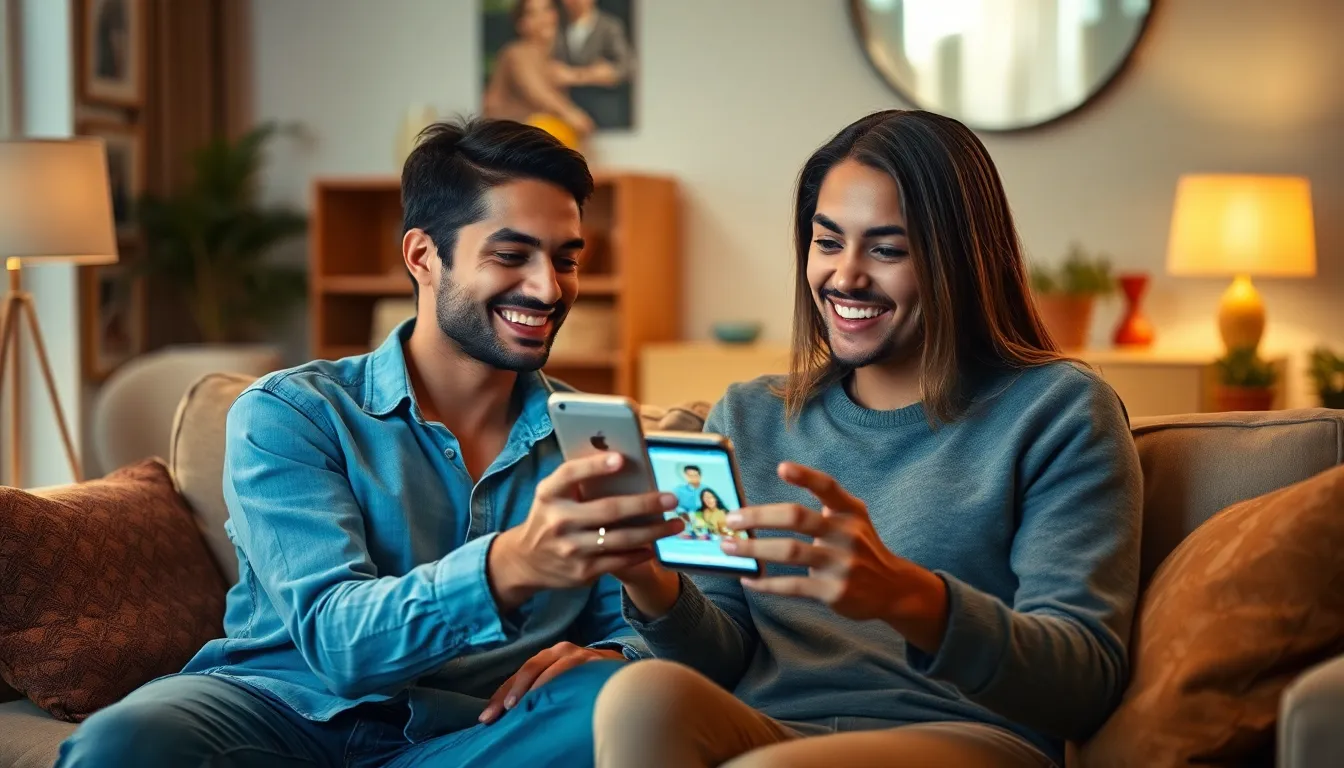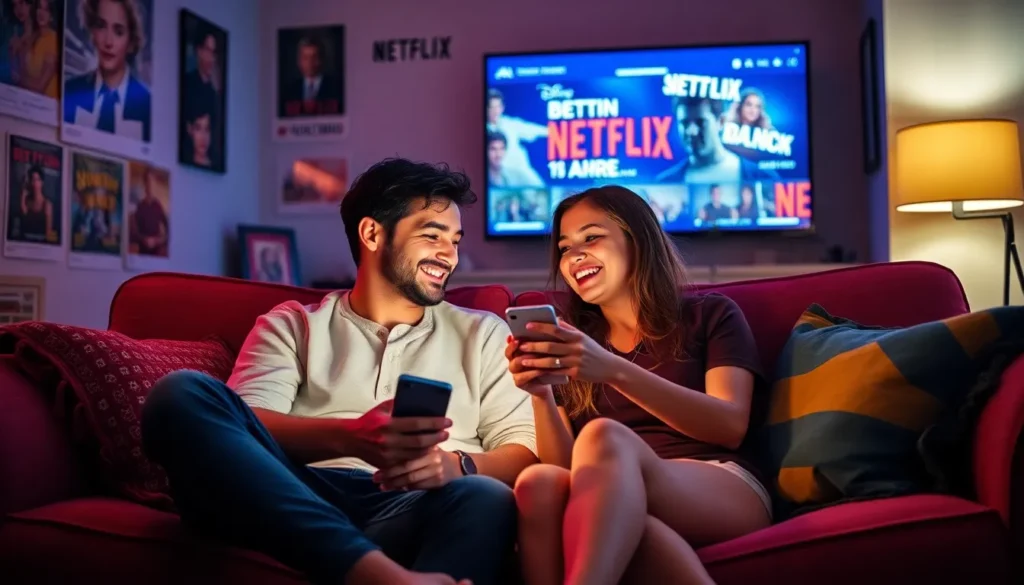Table of Contents
ToggleIn a world where swiping right is the new courtship and TikTok dances double as date ideas, Gen Z is redefining romance in ways that leave older generations scratching their heads. Gone are the days of candlelit dinners and love letters; today’s lovebirds are more likely to share memes and binge-watch the latest Netflix series together.
Overview of Gen Z Romantic Trends
Generation Z reshapes romance through digital interactions. They often prioritize online communication, using social media platforms to express feelings. This generation leans towards casual dating rather than long-term commitments. Flings and situationships dominate their love lives, allowing flexibility and exploration.
Modern courtship also features a strong influence from pop culture. Popular streaming services serve as a backdrop for many dates, with binge-worthy series creating shared experiences. Memes and TikTok trends function as playful conversation starters, often leading to deeper connections. Communication remains fluid, with text messages taking precedence over phone calls.
Inclusivity plays a significant role in Gen Z relationships. Diverse sexual orientations and gender identities are embraced, leading to more open-minded dating practices. This generation values emotional connection and understanding, often prioritizing mental health in their relationships. Trust and communication form the foundation of their romantic interactions.
Gift-giving routines reflect a shift in perspective. Customized gifts or experiences now hold more significance than physical items. Celebrations of anniversaries or special occasions focus on meaningful gestures over traditional expectations.
Navigating romance in this digital age requires adaptability. As Gen Z continues to evolve, so do their approaches to love. They blend technology and authenticity, creating unique experiences that resonate with their values and preferences.
Digital Dating and Its Impact

Generation Z’s approach to dating significantly relies on technology. Online platforms shape how they meet and engage with each other.
Popular Dating Apps Among Gen Z
Tinder stands out as a leading choice for casual encounters. Bumble empowers women by allowing them to initiate conversations. Hinge emphasizes meaningful connections based on user prompts. Each app has unique features catering to Gen Z’s desire for flexibility and exploration in romantic relationships. Reports indicate that 40% of Gen Z singles actively use dating apps, demonstrating the technological shift in how they pursue romance.
The Role of Social Media in Relationships
Social media platforms play a vital role in shaping Gen Z’s relationships. Instagram facilitates romantic expression through shared posts and stories. Snapchat encourages quick sharing of moments, enhancing connection. TikTok fuels relationship trends, inspiring shared experiences and playful ideas. These social channels create opportunities for engagement and communication, with 70% of Gen Z indicating that online interactions deepen their connections. By valuing authenticity and creativity, social media transforms the landscape of modern romance.
Communication Styles in Gen Z Relationships
Generation Z embraces unique communication styles in their romantic interactions. Digital platforms play a pivotal role in shaping conversations, providing a significant shift from previous generations.
Texting Vs. Face-to-Face Interactions
Texting dominates Gen Z’s communication landscape. Many prefer exchanging messages over face-to-face conversations, influencing the depth of their connections. Instant replies into group chats foster a sense of community and belonging. Sharing daily experiences via text creates opportunities for bonding that face-to-face meetings might not. Additionally, 80% of Gen Z indicates that texting feels less intimidating than in-person conversations. More complex discussions often translate better into written form, aiding clarity in emotional expression. While face-to-face interactions remain important, most Gen Z members prioritize texts for their ease and immediacy.
The Influence of Emojis and Memes
Emojis serve as vital emotional connectors in Gen Z relationships. Many express feelings and sentiments through these symbols, adding nuance to digital conversations. Memes reflect their shared culture, acting as conversation starters. More than 60% of Gen Z singles indicate that memes help lighten discussions, breaking the ice in new relationships. Humor becomes a powerful tool for connecting and fostering an environment of playfulness. By using memes, couples convey feelings and experiences that resonate deeply with their peers. This blend of humor and emotions makes communication relatable and engaging.
Unique Relationship Norms
Generation Z showcases unique relationship norms that diverge from traditional romantic frameworks.
Open Relationships and Non-Monogamy
Open relationships appeal to many in Generation Z, as they prioritize personal freedom and exploration. Non-monogamy allows individuals to connect with multiple partners without the constraints of conventional commitments. Many view these arrangements as opportunities for emotional growth and self-discovery. According to surveys, 25% of Gen Z participants reported having experience with open relationships, reflecting a notable shift towards flexibility in romantic engagements. This trend invites conversations about love that extend beyond classic monogamous expectations, encouraging transparency and honesty.
The Importance of Consent and Boundaries
Consent and boundaries play crucial roles in Gen Z relationships, emphasizing the need for mutual understanding. Open and honest communication forms the backbone of their interactions. Setting clear boundaries fosters healthy connections and aligns partners’ expectations. Statistics indicate that 81% of Gen Z individuals value discussions about consent in their relationships, illustrating a commitment to ethical romantic practices. Establishing boundaries creates safe spaces for emotional vulnerability, redefining relationship dynamics and deepening mutual respect.
Challenges Faced by Gen Z in Romance
Generation Z encounters unique challenges in romantic relationships. In a world saturated with digital interactions, mental health issues often surface, contributing to dating anxiety.
Mental Health and Dating Anxiety
Dating anxiety frequently affects Gen Z individuals. Approximately 62% of this generation report feeling anxious when dating, primarily due to pressure from social media standards. Many find it challenging to keep up with constant online comparisons, leading to diminished self-esteem. Emotional vulnerability becomes difficult when one feels the need to maintain a perfect online persona. Feeling overwhelmed, they may avoid in-person interactions altogether. The fear of rejection amplifies anxiety, as 57% of Gen Z singles express concerns about ghosting and inconsistent communication. Ultimately, this anxiety hampers their ability to connect genuinely, often creating a cycle of avoidance.
Navigating Breakups in a Digital Age
Breakups in the digital age pose distinct challenges for Gen Z. After a breakup, 70% of them remain connected to their ex-partners on social media, complicating the healing process. Constant reminders of past relationships can lead to prolonged emotional distress. Emotional closure often proves elusive when social media opens the door to lingering connections. Many turn to digital spaces for support, as 58% report seeking advice from friends on platforms like Instagram and TikTok. This reliance on online spaces creates an unrealistic comparison to others’ experiences, making recovery more difficult. Finding clarity in communication becomes essential, yet many struggle with how to navigate these conversations effectively in the public eye.
Generation Z is redefining romance in ways that reflect their unique values and experiences. Their approach emphasizes digital connection and emotional authenticity while embracing inclusivity and flexibility. As they navigate relationships through memes and streaming services they prioritize meaningful interactions over traditional norms.
The challenges they face reveal a deeper understanding of mental health and communication in romance. By fostering open discussions about consent and boundaries they create healthier relationship dynamics. As Gen Z continues to shape the landscape of modern love their innovative practices will likely influence future generations, proving that romance can evolve while remaining deeply personal and impactful.




